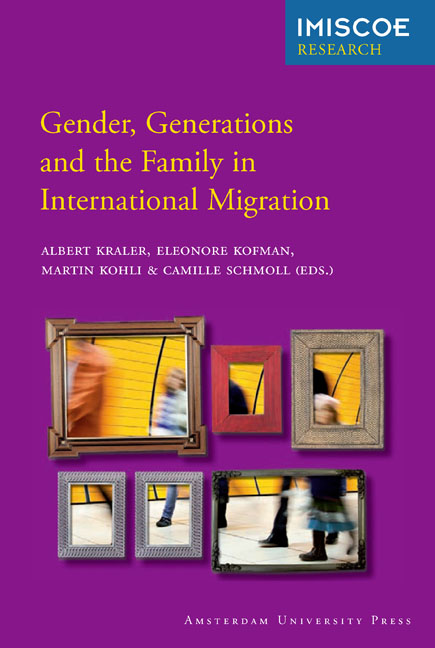Book contents
- Frontmatter
- Contents
- Preface
- 1 Introduction: Issues and Debates on Family-Related Migration and the Migrant Family: A European Perspective
- Section I The Family as a Moral and Social Order
- Section II Gender, Generation and Work in the Migrant Family
- Section III Marriage Migration and Gender Relations
- Section IV Transnational Family Lives and Practices
- List of Contributors
- Index
- Other IMISCOE titles
7 - The Transmission of Labour Commitment Within Families of Migrant Entrepreneurs in France and Spain
Published online by Cambridge University Press: 21 January 2021
- Frontmatter
- Contents
- Preface
- 1 Introduction: Issues and Debates on Family-Related Migration and the Migrant Family: A European Perspective
- Section I The Family as a Moral and Social Order
- Section II Gender, Generation and Work in the Migrant Family
- Section III Marriage Migration and Gender Relations
- Section IV Transnational Family Lives and Practices
- List of Contributors
- Index
- Other IMISCOE titles
Summary
Introduction
Studies into ‘family businesses’ have traditionally revealed the need to link home and business environments (Finch & Mason 1993), highlighting the interaction between family relations and the development of small businesses that require capital and family labour both at their initial stages and in order to survive (Baines & Wheelock 1998; Wheelock & Baines 1998). Indeed, certain authors go as far as to speak of a ‘family embeddedness perspective’ (Aldrich & Cliff 2003) (see review of this literature by Ram, Sanghera, Abbas, Barlow & Jones 2000; Jones & Ram 2007).
In turn, studies into ‘ethnic businesses’ have also acknowledged the role of the family as a kind of social capital, within the framework of the ethnic resources that migrants usually resort to when setting up a business. For example, Raijman and Tienda (2003) highlight the way in which Koreans in Chicago have a far greater tendency to open up a business than their Mexican counterparts, due to the differences in access to capital via ethnic and family sources. As Ram et al. (2001) state, most of the literature addressing the issue of the family within the framework of ethnic businesses stresses the fact that cultural differences impact on the business dynamics. Consequently, certain immigrant communities appear to benefit from greater facilities when setting up and maintaining businesses, as a result of solidarity, family ideologies or cultures that promote business activity, as in the case of South Asians (Boissevain & Grotenberg 1987; Boyd 1990; Kibria 1994; Mingione 1999; Sanders & Nee 1996; Werbner in Ram et al. 2001).
However, few studies have addressed the issue of ethnic business within the framework of immigrant household dynamics (Kibria 1994; Sanders & Nee 1996; Ram et al. 2000; Ram et al. 2001; Sanghera 2002). And even fewer have analysed the role of the second generation within family and business relations (Apitzsch 2005; Peace & Hulme 1994; Song 1997, 1999; Ram et al. 2001; Sanghera 2002). Likewise, the analysis of transnational households, from the perspective of family and business strategies, including intergenerational and gender perspectives, has received scant attention.
As pointed out by Catarino and Morokvasic (2005), the issue of transnational households is often associated in the literature with immigrant men sending remittances to their family left behind abroad, whilst their female counterparts are mainly relegated to the reproductive role or their function as transnational mothers within the so-called global care chain.
- Type
- Chapter
- Information
- Gender, Generations and the Family in International Migration , pp. 163 - 192Publisher: Amsterdam University PressPrint publication year: 2012
- 1
- Cited by



